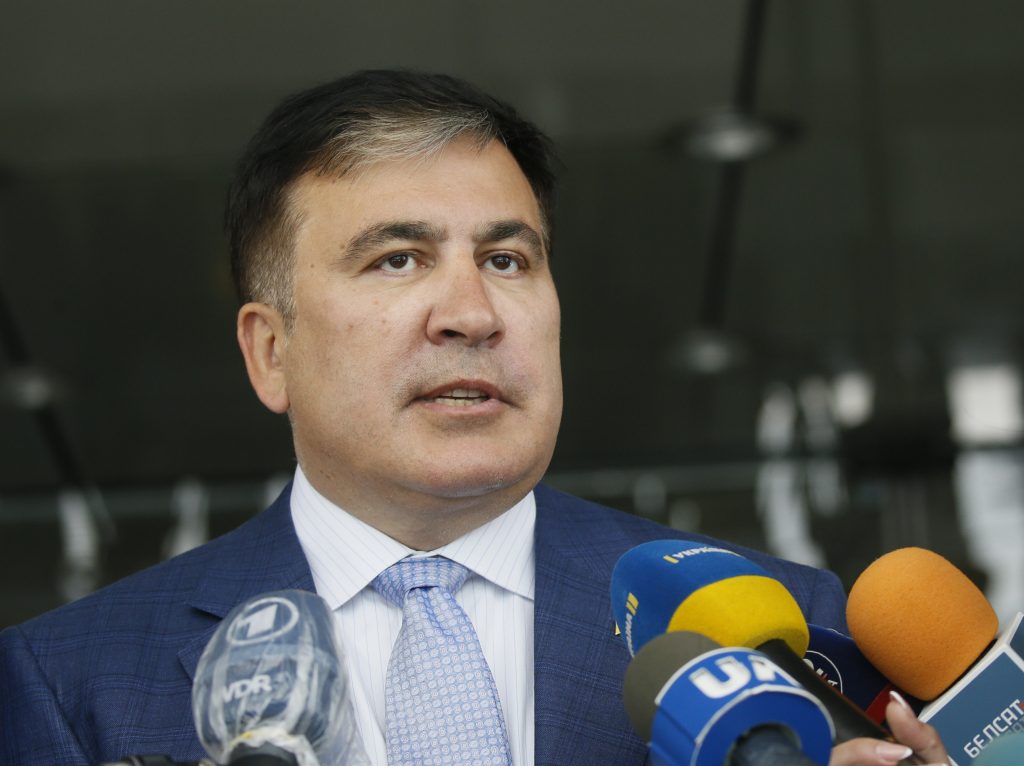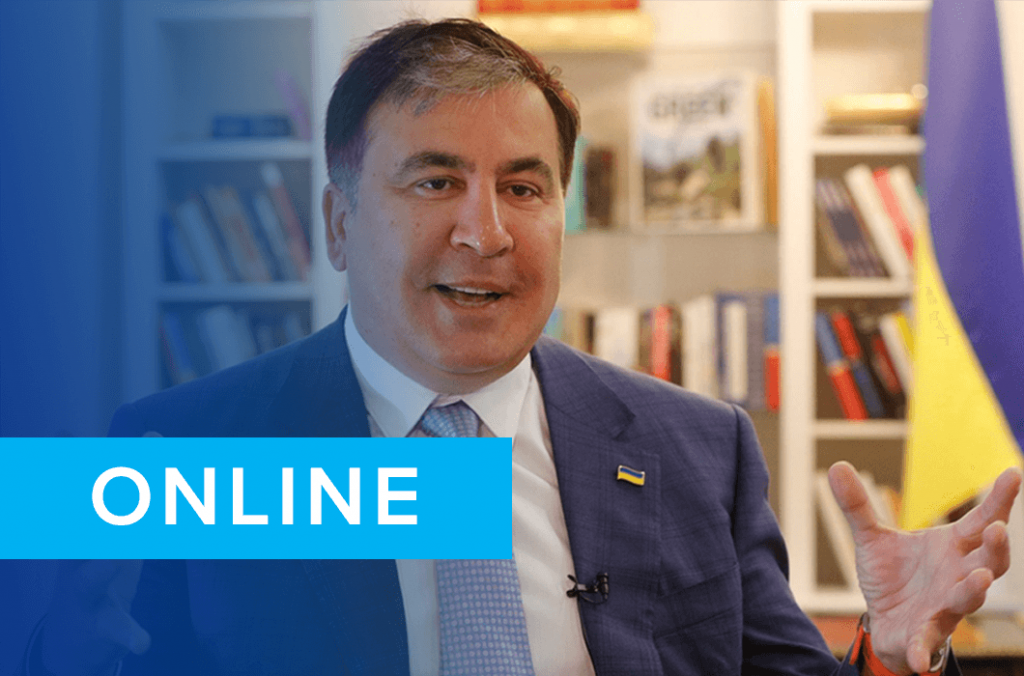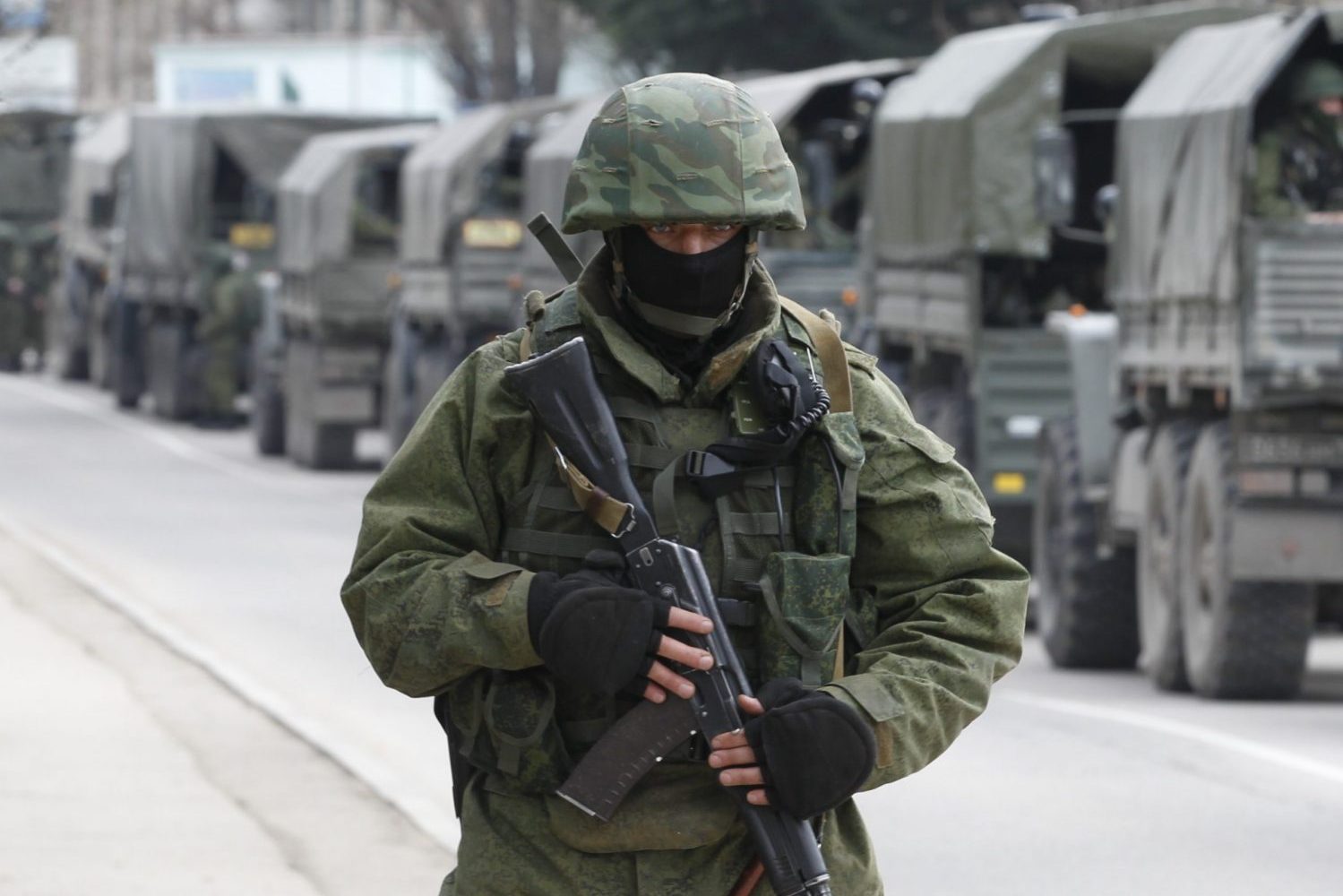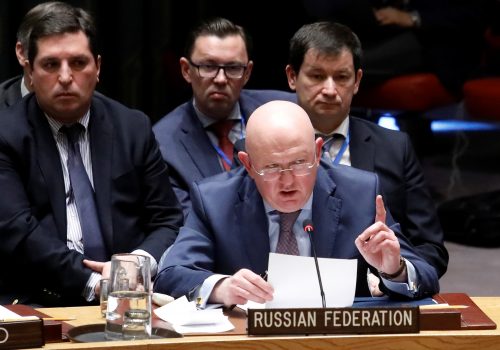Ukrainian MPs are expected to gather in the coming days to vote on the appointment of former Georgian president Mikheil Saakashvili as the country’s new Deputy Prime Minister for Reforms. President Zelenskyy’s surprise move to recruit the headline-grabbing Georgian caught everyone off guard. It is a huge gamble that has already succeeded in temporarily overshadowing the coronavirus crisis and the ongoing war with Russia, but can it revive Ukrainian hopes of fundamental reform?
Becoming Ukraine’s Deputy PM would represent the latest twist in what has already been a remarkable political career by any standards. Saakashvili first emerged in the early 2000s as the poster boy of post-Soviet reforms in his native Georgia. He served two terms as president and waged a brief war with Putin’s Russia before eventually falling from grace, only to then reinvent himself as a rabble-rousing reformist Ukrainian politician.
Saakashvili has longstanding ties to Ukraine, having studied as an undergraduate in Kyiv during the late Soviet era and early years of Ukrainian independence. Saakashvili returned to Ukraine after losing the Georgian presidency and facing the prospect of prosecution in his homeland for alleged abuse of office. He soon thrust himself back into the political limelight as a vocal supporter of Ukraine’s Euromaidan Revolution and opponent of the subsequent Russian military interventions in Crimea and eastern Ukraine. In May 2015, Saakashvili was granted Ukrainian citizenship by President Poroshenko and appointed governor of the famously cosmopolitan Odesa region on Ukraine’s Black Sea coast.
Saakashvili’s time in southern Ukraine proved highly entertaining but was ultimately anti-climatic. After failing to dislodge local vested interests and complaining about a lack of political support from Kyiv, he resigned in November 2016 and sought instead to establish himself as the figurehead of a nationwide anti-corruption movement. Now in open opposition to the government of his former patron President Poroshenko, Saakashvili’s dreams of leading Ukraine’s historic transformation gave way to escalating political farce. He established a tent city protest camp outside parliament, was stripped of his Ukrainian citizenship and barred from the country, broke back into Ukraine, and was forcibly ejected once more. His brief career as a Ukrainian politician appeared to be over.
President Zelenskyy reinstated Saakashvili’s Ukrainian citizenship last year, but most observers believed this was merely a gesture designed to spite Zelenskyy’s predecessor Poroshenko. Indeed, until news broke of the Ukrainian president’s recent proposal, there was little to indicate that the former Georgian leader was even under consideration for a return to front line Ukrainian politics.
There are no guarantees that his candidacy will now be approved by parliament. Saakashvili is a polarizing figure and it remains far from clear whether Zelenskyy will be able to muster the necessary votes to confirm his appointment. If the former Georgian leader does become Deputy Prime Minister of Ukraine, it would be a remarkable personal achievement for Saakashvili himself, but what could it mean for Ukraine?
Anders Åslund, Senior Fellow, Eurasia Center, Atlantic Council: After the change of government in early March, the new Ukrainian authorities are struggling with two problems. Firstly, they have lost a sense of direction. The incoming cabinet of ministers never issued a program and was caught in the whirlwind of the pandemic, which demands short-term actions. The second problem is that the new government seems more divided than its predecessor between the forces of reaction and reform. Mikheil Saakashvili could offer a unique cure for both problems. He has a clear reform program, which is the swift imposition of the rule of law and the cutting of Soviet red tape, and he has proven that he can explain and execute it. This is the reform program Ukraine needs and it would steel the new government against the forces of reaction. Opposition to Saakashvili comes primarily from two sources. Most important are the forces of darkness, which is a strong argument in favor of Saakashvili. Others fear that Saakashvili is too strong and will want to become prime minister. Really? After years in the political wilderness, Saakashvili, who is highly intelligent, is bound to know better and appreciate that Ukraine needs a strong force for reform.
Pavlo Klimkin, former Ukrainian Minister of Foreign Affairs (2014-19): Generally speaking, the idea of a politician becoming a public figure in two or more different countries is a very interesting one. There have previously been very few such attempts, and no obvious success stories. Instead, issues of language and mentality remain decisive. The case of Saakashvili is unlikely to set a precedent, but in the coming years it could lead to interesting repercussions. For now, everyone who cares about Ukraine has a clear perception of who Saakashvili is. His appointment will not change these perceptions, nor will it change attitudes towards Ukraine. Tensions with Georgia are likely, but this should be manageable. Saakashvili’s possible role in Ukrainian politics is full of unknowns. The very idea of appointing him as Deputy PM for Reforms is bizarre and invites the question of what the prime minister and his entire government are there for. It is likely that Saakashvili’s main functions will be to create media spin and to play a part in the bickering between key business groups. This is where things could get really interesting, if Saakashvili is used as a kind of disruptive factor in Ukrainian politics.
Stay updated
As the world watches the Russian invasion of Ukraine unfold, UkraineAlert delivers the best Atlantic Council expert insight and analysis on Ukraine twice a week directly to your inbox.
Alyona Getmanchuk, Director, New Europe Center: At the moment, it looks like the Saakashvili appointment will create more challenges than benefits for Ukraine, both internally and externally. Internally, memories of Saakashvili’s previous experience in an official Ukrainian government role suggest that we can expect internal conflicts and distracting noise rather than genuine action. Externally, his appointment will not help Ukraine improve cooperation with our international partners. Georgia will certainly not be happy. This concern will be shared by some of Ukraine’s Western partners, especially those who warned former Ukrainian president Petro Poroshenko back in 2015 not to appoint Saakashvili as Odesa governor due to his dubious reputation and unpredictability. Generally speaking, Saakashvili lacks the qualities of loyalty and teamwork that President Zelenskyy seeks in candidates for key positions. The Deputy Prime Minister for Reforms position which he is set to fill also indicates a poor understanding of the reform process itself. Ukraine’s reform agenda is a broad and comprehensive undertaking that necessarily involves every ministry and cannot by definition be the responsibility of any one person. I am therefore highly skeptical about this proposed appointment, although I will be happy to be proven wrong.
Brian Mefford, Senior Fellow, Eurasia Center, Atlantic Council: Mikheil Saakashvili was effective in Georgia because he always had a parliamentary majority which would pass key legislation. In Odesa, Saakashvili lacked power and the ability to get things done, leading to public disappointment and a dramatic decline in his popularity. Now he has a new lease of life in his political career and a governing majority in the Ukrainian parliament to pass legislation. The question is, will President Zelenskyy give him the autonomy to pass real reforms, or is this a diversion to distract attention from recent oligarch-friendly government appointments? Also, Saakashvili has been most successful in his career as a one-man bulldozer, rather than a consensus builder. With fractures already visible in Zelenskyy’s parliamentary majority, the question is how will Servant of the People MPs react to Saakashvili’s political methods, and will he be able to work with other officials like Interior Minister Arsen Avakov, who is arguably the most powerful man in the current government? At a minimum, the next few months will not be boring.
Ivanna Klympush-Tsintsadze, Chairperson, Ukrainian Parliamentary Committee on EU Integration: This proposed appointment is President Zelenskyy’s attempt to liven up the political soap opera of his administration. He seems to need it in order to draw attention away from his inefficiency and lack of professionalism. If Saakashvili is appointed, we can expect to see the same levels of hype and scandal that accompanied his previous appearance on the Ukrainian political landscape. Saakashvili did not manage to deliver any practical results during his tenure as governor of Odesa region. Instead, he introduced chaos along with numerous violations of Ukrainian legislation. There are additional concerns regarding the international implications of his candidacy. A number of court rulings against Saakashvili came into force in Georgia in 2018. His possible appointment is creating considerable anxiety among Ukraine’s Georgian partners and threatens to cause a serious rift in bilateral relations.
Andy Hunder, President, American Chamber of Commerce in Ukraine: The business community was initially somewhat stunned with the news that Saakashvili is making a potential comeback to Ukraine’s government. However, after analyzing the possible scenarios, there is now hope that he may indeed be a driver to push through much-needed reforms. The top priorities for the business community are cooperation with the International Monetary Fund to ensure macroeconomic stability, and restarting the economy. Hopefully, Saakashvili can be the person to shake things up by focusing on a reform agenda aimed at economic recovery and growth. Our understanding is that this is a short-term appointment, as Saakashvili hopes to return to his native Georgia. This may happen after autumn’s parliamentary elections in Georgia if his political party does well. Saakashvili certainly has an impressive CV. Still only 52 and with plenty of fire in his belly, he is an extremely passionate politician. We will most definitely witness heated debates whenever he is in the room. Saakashvili’s potential appointment may also counterbalance the role of oligarchs who are continuously seeking to influence President Zelenskyy’s government. If Saakashvili is appointed and manages to bring in new people, we can expect turbulence which may eventually lead to positive changes and reforms.
Brian Bonner, Chief Editor, Kyiv Post: He’s a colorful re-entry to Ukrainian politics. He’s fearless in attacking corruption. But this is a poor substitute for a real reform program. Zelenskyy has already damaged the prospects for police, prosecution, and judicial reform by the moves he has made including the people he’s kept or appointed, such as Arsen Avakov, Ihor Bakanov and Nazar Kholodnytsky. One person is not going to undo the damage. While individual reasons may differ, the list of respected reformers who have been kicked out of public service during the first year of Zelenskyy’s presidency is staggering: Andriy Bohdan (yes, you read that right), Ruslan Riaboshapka, Oleksandr Danylyuk, Oksana Markarova, Tymofiy Mylovanov, Serhii Verlanov, Max Nefyodov and on and on. Appointing Saakashvili will divert attention and buy Zelenskyy a little more time. However, the political will to combat corruption needs to come from the top, and Zelenskyy hasn’t shown he’s up to the task yet. A criminal bank fraud indictment against Ihor Kolomoiskiy would be a good start.
Michael Bociurkiw, Global Affairs Analyst: Shortly after the Christian world celebrated the resurrection of Jesus, Ukraine saw its own miraculous political resurrection in the form of the return of Mikheil Saakashvili to the country’s tumultuous political scene. The former Georgian president appears to have more political incarnations than most cats have lives. While some of us may be tempted to celebrate the introduction of considerable additional color into Ukrainian politics, I am left wondering why President Zelenskyy felt the need to reach outside for talent. Saakashvili’s appointment would not be completely unprecedented, however. I used to joke that there are about as many Georgians working in the Ukrainian government as there are Georgian restaurants in Kyiv. Perhaps they are simply more suited to the rough and tumble of Ukrainian politics and bureaucratic red tape than some locals. I am prepared to give Saakashvili the benefit of the doubt, especially because of his street cred as a genuine reformer. However, don’t be surprised if his notorious ego and penchant for theatrics ends up rubbing Zelenskyy, and more importantly the Ukrainian people, the wrong way. Like a cat stuck on a rooftop, will the former Georgian president need to be rescued from political heights he should never have scaled in the first place?
Volodymyr Dubovyk, Associate Professor, Odesa Mechnikov National University: Saakashvili is a larger than life character who provokes either outright dismissal or endless praise. In reality, he is not so straightforward. As president of Georgia, he went from highly acclaimed reformer to soft authoritarian. His entry into Ukrainian politics in 2015 was seen as a promising sign for the country. Saakashvili’s appointment as Odesa region governor was a bold, unorthodox move that led to unrealistically high expectations. He was initially a good fit for Odesa’s outgoing personality and shook up the city, generating unprecedented levels of civic activism. However, it soon became evident that he favored grandstanding over methodical work and was more interested in nurturing his own ego than actual team-building or practical achievements. Based on this experience, the decision to offer Saakashvili the post of Deputy PM looks like a sign of desperation on the part of Ukraine’s current authorities. He cannot and will not jump start reforms. He will not be a team player and will instead enter into conflicts with other members of the government. This makes his potential appointment a temporary distraction from the already damaged reformist credentials of the Zelenskyy government.
Peter Dickinson is editor of the Atlantic Council’s UkraineAlert blog.
Further reading
The views expressed in UkraineAlert are solely those of the authors and do not necessarily reflect the views of the Atlantic Council, its staff, or its supporters.


The Eurasia Center’s mission is to enhance transatlantic cooperation in promoting stability, democratic values and prosperity in Eurasia, from Eastern Europe and Turkey in the West to the Caucasus, Russia and Central Asia in the East.
Follow us on social media
and support our work
Image: Former Georgian president Mikheil Saakashvili speaks with journalists after meeting with MPs from President Zelenskyy's Servant of the People party in Kyiv. April 24, 2020. REUTERS/Valentyn Ogirenko





